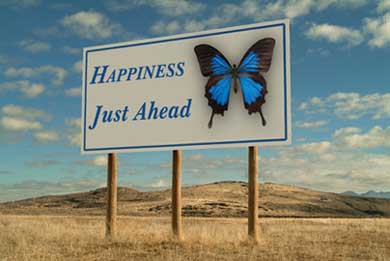Can Money Buy Happiness?
 “He who has so little knowledge of human nature as to seek happiness by changing anything but his own disposition will waste his life away in fruitless efforts.”
“He who has so little knowledge of human nature as to seek happiness by changing anything but his own disposition will waste his life away in fruitless efforts.”
David Myers, Ph.D., a professor at Michigan’s Hope College, studied the effect of money on happiness in his book, The Pursuit of Happiness. Research on happiness conducted around the world in both rich and poor countries has failed to find that people in richer countries are happier overall than those in poorer countries. Myers notes that in surveys conducted by the University of Michigan, people’s levels of satisfaction with their income mattered more than their actual amount of income. Psychologist interviewed the wealthiest Americans listed by Forbes and found them to be only slightly happier than the average American.
Myers believes that wealth seems to be a never-ending cycle of attaining the next goal whether it’s a trip, a car, or technological gadget. In other words, the more you have, the more you want.
Today, “necessities” are the latest CDs, computer accessories, and clothing fads, which are much different than the “necessities” of 30 years ago. Yet, people today aren’t reporting that they are any happier now those surveyed 30 years ago.
A reason for this could be what Myers and his colleagues call “poortalk” — talking about being unable to afford things believed to be necessities, and how, over time, this thought pattern results in greater life dissatisfaction. 9
In today’s society, people have more opportunities available to them to enjoy greater wealth and status than in recent years yet people aren’t rating themselves any happier. Drs. Timothy Wilson of the University of Virginia and Daniel Gilbert of Harvard University believe it’s a case of “miswanting.” In a textbook they co-authored, they say that what people think they want many times isn’t really what they want at all. As a result, people still find themselves unhappy.
Miswanting: What people think they want many times isn’t really what they want at all.
In a study where subjects were asked to decide which snacks they would like to eat on three consecutive Mondays, people ordered mixed plates that included their favorite snacks, including Snickers bars on the first two Mondays and tortilla chips on the third Monday. When it came time to eat the snacks, the subjects said they weren’t happy with their choices. They said what had sounded like a good idea at the time — a Snickers bar at every snack — wasn’t really what they wanted to eat when the time came.
“We may misconstrue events, misunderstand ourselves, misinterpret our feelings – and any of these mistakes can be a cause of miswanting,” say Dr. Wilson and Dr. Gilbert. “In short, things do not always feel the way we expect them to feel.”
People often think of unhappiness as something that happens when they don’t get what they want. However, it’s difficult to predict the things that will bring happiness. Often, once people have something they thought would make them happy, they find out that it wasn’t really the experience they had anticipated. Reality is sometimes much different than perception.
“In order to be utterly happy, the only thing necessary is to refrain from comparing this moment with other moments in the past, which I often did not fully enjoy because I was comparing them with other moments in the future.”

